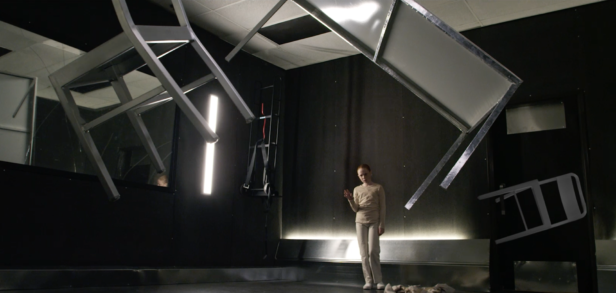“Children like games.”
The term ‘prodigy’ is often used of young children who can beat even skilled adults at chess. Accordingly in Alex Haughey and Brian Vidal’s feature debut of the same name, chess has a prominent part, although the gamesmanship involved is used not to confer dominance, but to expose a little girl’s repressed feelings.
Prodigy shows a death match of sorts between kindly psychologist James Fonda (Richard Neil) and Ellie (Savannah Liles), the freckled nine-year-old whom he has been asked to evaluate – and just how high the stakes are becomes readily apparent when Fonda sees that Ellie is being kept restrained in a secure military facility, and made to wear a straitjacket and sometimes even a Hannibal Lecter-style mask. Fonda, who has no more read her record than we have, must work out why this supersmart yet overweening bundle of precocity has been deemed such a risk, and must also try to break through her arrogant posturing before her time is up.
Fonda quickly learns that Ellie is an apparently contrition-free matricide with a heightened (and very probably justified) sense of superiority over others, and a determination to exhibit her lack of empathy – but he only gradually discovers the other powers that she is concealing, powers that make her like Carrie with an inflated IQ. In the battle of wits that develops between this sad psychologist, the extremely dangerous girl young enough to be his daughter, and the others keen to test a more radical investigation of Ellie’s abilities, Fonda will play his every move like both a Master and a mensch – always one step ahead, and always pushing Ellie to show her well-hidden humanity.
Despite occasional cuts to a control room where a team discusses Ellie’s fate, Prodigy is mostly a two-hander, with a claustrophobic unity of time and space. The contrasts of age, sex and visible affect between Neil and Liles introduce sufficient tension to sustain the simple narrative for its relatively short duration.
